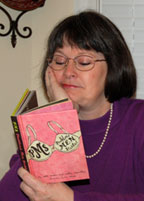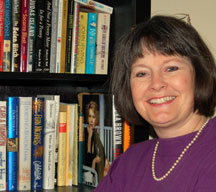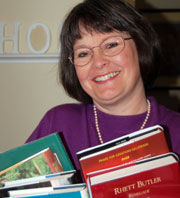ou’ve written this book, right? You want this book in print so badly you design the cover in your sleep, but have no clue how to become published. Or, you’ve only known self-published authors and fear the bureaucracy of traditional publishing. You don’t even understand your options, but you know enough to realize that the wrong decision is permanent and damaging.
Most new writers think their publishing options are traditional and self-publishing, one or the other. If only the choices were so simple. Self-publishing has degrees of author versus press cooperation, and traditional can mean conglomerate, mid-level and small presses. In the continuum of publishing, small presses fit in the middle. In the political arena, they’d be the moderates, the independents who want a choice.
Small presses are called independent presses, small publishers, university presses, alternative presses, and regional presses. They may publish three to several dozen books a year. They often specialize in genre, geographical region, ethnic group, gender, age, or culture.
How do you decide where to pitch your baby? You learned in high school how to draw two columns on a piece of paper and list the pros and cons of any major decision. But this isn’t an either/or decision. Let’s turn this into a self-analysis test where your score helps you see where you stand in your comfort level with publishing styles. Take the test first, without reading the rest of the article. Note the number of ones, twos, and so on. After reading the narrative that follows, you may desire to take the test again to see if some of your answers change.

“While small presses are highly selective, they are more willing to take a chance on a new author…”
1 = Absolutely not
2 = Not sure I want someone sharing my money
3 = Don’t care one way or the other
4 = Would be nice, but it’s hard to find one
5 = Absolutely yes
1 = As few as possible
2 = A handful
3 = Rejections are okay if they help me
4 = Two or three dozen. I’ll play the game
5 = As many as it takes to get a major contract
1 = I want to dictate it all, from cover to cover
2 = I don’t have to know the technology, but I want to make lots of choices
3 = Ask me if I like it before it’s printed
4 = Just let me agree on the title and cover
5 = I trust the publisher to make it shine
1 = I’ll do what I can
2 = Whatever I can afford
3 = Every weekend and online
4 = I’ll take off work and work every weekend and holiday. I smoke online.
5 = Just name the date, I’m there.
1 = I need to take my time to promote, sell, and become known
2 = I have some contacts but don’t want to sell in a frenzy
3 = I can sell this book, but not thousands in a month
4 = I intend to create a promotional blitz and sell fast
5 = I’m living this book, creating a hyped marketing plan, hoping to make a bang in six weeks
1 = Yes.
2 = Yes.
3 = Yes, maybe
4 = Not really.
5 = No.
“Fact is, self-publishing, small presses, and major houses have unique traits…”
LOL. I’ll bet some authors could boil water with the steam they’re giving off right now. I generalized, stereotyped, and oversimplified publishing in those questions, painting the world of publishing with a crayon.
Fact is, self-publishing, small presses, and major houses have unique traits, similar to those I alluded to above, but no rule is absolute. Let’s revisit these questions again. This time, I want to show you how small presses can be the best of all worlds.
An agent will take 7% to 20% of your royalty income, but they can also negotiate the best contracts. Major publishing houses won’t give you the time of day without one. A small press will accept you with or without an agent. Some prefer no agent. If you feel comfortable with contracts, or if you can obtain legal counsel comfortable with intellectual property and publishing, you can wing it without an agent. With a small press, you sign with a traditional publisher, earn more respect than you would by self-publishing and put more of your income in your pocket.
If you attend conferences and listen to agents, you’ll soon learn that agents might look twice at no more than ten percent of their slush pile. Of those, they might request a couple of full manuscripts a week. The numbers vary depending upon the agency, but publishers reject even more. And big houses won’t open the envelope without agency representation. The higher you go on the publishing food chain, the louder the NO.
While small presses are highly selective, they are more willing to take a chance on a new author, a new concept or a new style. They also reject many more queries than they accept, but they read with a more liberal eye. Keep in mind that there are many more small presses than large houses. Your odds are better.
“A large publisher will take nearly every decision out of your hands…”
You already know that you have many choices to make in self-publishing. Some authors adore this. Others just want a great-looking book and don’t care how it becomes such. A small press has its own style and standards, but you are more likely to be involved in some of the process. They enjoy working with writers in a more direct manner and are willing to listen to how the writer envisions the finished product. A large publisher will take nearly every decision out of your hands.
You may have heard that nobody markets an author anymore—regardless of what kind of publishing you do. Truth is, a traditional press has better marketing and distribution. The larger the press, the better the assistance. The small press cannot do grand marketing, but they can assist, and you can learn from their experience. Distribution is much better with a small press than self-publishing. A small press can take some of the headache out of marketing, but nobody replaces the sweat you have to invest.

“The best thing about small presses is that the author has a measure of control over the process. The worst thing about small presses is that the author has a measure of control over the process…”
Traditional publishers put a shorter shelf life. If it doesn’t sell promptly, if you haven’t prepared in advance for an explosive release date, your book could spend no more than six weeks in the public’s eye then be removed from bookstore shelves. With small presses, you may have a year or more to breathe life into your sales. They aren’t as quick to move on to the next writer, the next book, the next great idea. They invest for a longer journey.
Traditional publishers want new material but not too extreme. Smaller presses are more daring with subject matter, novelty and new ideas. Some cater to literary works and others to genres such as sci-fi. Some prefer historical or geographical specificity. A few cater to women, or ethnic groups, or political preferences. The great news is that you have a greater chance of finding one that thinks like you do.
You can not undo publishing. If you are like many writers, the small presses become suddenly appealing once you learn their strengths. Like any publishing venue, it has its down side, too. Kathryn Wall is a seven-time published mystery writer. Her eighth book, Mercy Oak, comes out through St. Martin’s Press in April 2008.
“With small presses, you may have a year or more to breathe life into your sales…”
“The best thing about small presses is that the author has a measure of control over the process. The worst thing about small presses is that the author has a measure of control over the process,” says Ms. Wall. She self-pubbed her first book, so when she received a contract with a small press, she was thrilled. “A lot of the distribution problems inherent in POD (self-publishing) disappeared like magic. The press consisted of the owner and his family…When I spoke with the “company,” I was talking directly to the man who could say yea or nay. No middlemen, no hierarchy…The drawback was that I was spending a lot of time playing publisher’s assistant instead of writing.”
“For an author a small press can be a ticket into publication when the titans have turned him or her down, for whatever reason. Small presses with sound financial underpinnings and a realistic vision of the market and how it works can be the answer to prayer, particularly for first-time novelists. I can say with certainty that, without the willingness of a small press to take a chance on me, the big NY deal for subsequent books would never have happened.”
***
Kathryn R. Wall – https://www.kathrynwall.com
Poets & Writers - https://www.pw.org/toolsforwriters
EPC List of Poetry Presses - https://epc.buffalo.edu/presses/
International Directory of Little Magazine and Small Presses - https://www.dustbooks.com/d.htm
New Pages List of Independent Publishers - https://www.newpages.com/npguides/bookpubs.htm
***

C. Hope Clark is editor and founder of FundsforWriters.com and author of The Shy Writer: The Introvert's Guide to Writing Success. She’s published in national publications like Writer’s Digest and The Writer Magazine and trade magazines like TURF, Next Step, College Bound Teen, American Careers and Landscape Management. Writer’s Digest selected her web site in its 101 Best Web Sites for Writers, for the last seven years in a row.